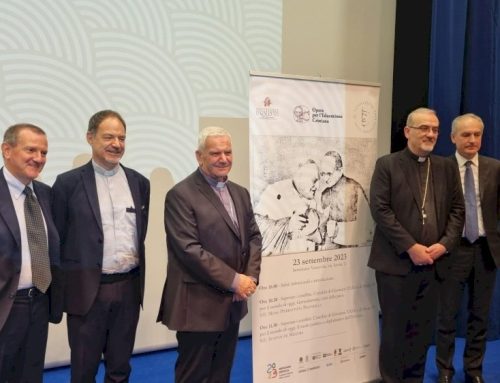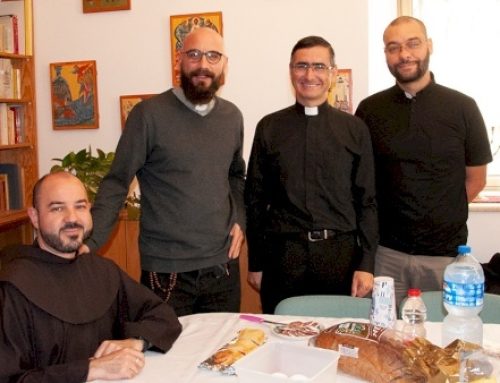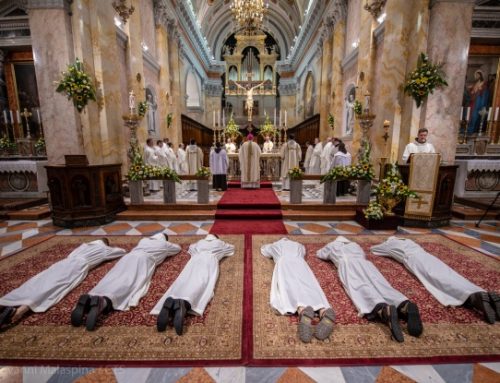ARCHDIOCESE – Stories of unrest in the Middle East and the Palestinian-Israeli conflict abound in the daily new reports, keeping us well informed on Jewish and Muslim tensions. Yet, largely unknown to many Americans is the plight of Palestinian Christians, who have lived under military occupation for more than 50 years, and now face daily injustice, violence and desperate living conditions.
ARCHDIOCESE – Stories of unrest in the Middle East and the Palestinian-Israeli conflict abound in the daily new reports, keeping us well informed on Jewish and Muslim tensions. Yet, largely unknown to many Americans is the plight of Palestinian Christians, who have lived under military occupation for more than 50 years, and now face daily injustice, violence and desperate living conditions.
The Holy Land is home to 123,000 Christians in Palestine and Israel and 160,000 in Jordan and, many of whom are descendents of the early Christians, explained Rateb Rabie, president of the Holy Land Christian Ecumenical Foundation (HCEF), who spoke with the Catholic Telegraph, last month. Rabie, along with Jesuit Father Drew Christiansen, a senior fellow at the Woodstock Theological Center and Counselor for International Affairs for the United States Conference of Catholic Bishops, addressed the subject of Christians in the Holy Land when they spoke to students and faculty at Xavier University on Feb. 26. Both have recently returned from a fact-finding mission to the Holy Land. Their situation is critical, Rabie said, and Palestinian Christians have come to think of themselves as the “forgotten faithful,” because of the isolation they feel from the rest of Christendom. They have been denied access to their places of worship, particularly in Jerusalem, their homes have confiscated and demolished, and there are limited employment opportunities for Palestinians. In addition, roads are frequently closed in and out of villages and designated for Israeli use only, and the identity cards of Palestinians are confiscated, keeping them from moving freely in their own territories.
With conditions as they are, Christians are leaving the Holy Land in large numbers, Rabie said. In 1948, the Christian population of the Holy Land was over 18%, but by 1999, it was less than two percent. The Christian population of Jerusalem was 51% in 1922, as compared to less than two percent today.
A non-profit organization founded in 1999, HCEF is working to educate Americans about the plight of Palestinian Christians, as providing moral and financial support that will assist them in remaining in the Holy Land, explained Rabie.
“We’re not interested in political power, but in keeping the heritage of Christians alive,” he said. “This is not just a concern for the Middle East, but for all Christians, because our heritage is in the Holy Land.”
HCEF is engaged in a number of projects geared toward “building solidarity and relationships,” between Americans Christians and their brothers and sisters in the Holy Land, Rabie noted.
“The idea is not just to raise money and send it there,” he said. “We want to offer more than money. We need to pray together, communicate with one another, people to people, church to church.”
Some of HCEF’s efforts in this regard include a child sponsorship program, through which American donors can support the education of indigenous Christian children in the Holy Land, parish partnerships between American and Palestinian parishes, and a student correspondence exchange, geared toward promoting cultural understanding between American and Palestinian children. HCEF is also working to provide a U.S. market for religious craft items, particularly olivewood, made in the Holy Land, to offer some economic stability to Christian families there, and is overseeing a number of projects focussed on improving employment, education and housing.
Key to developing understanding and relationships between American and Palestinian Christians is direct contact, so HCEF is also organizing pilgrimages to the Holy Land, including a trip scheduled for April 4-16. Christians run eighty-percent of the tourist industry there, Rabie said, and “we’re trying to encourage people to go to the Holy Land and help Christians there by using their businesses. It will give Christian business owners the hope and strength to carry on.”
“By staying with local families, people will also have a better understanding that we share the same faith, and that we all pray the same way,” he added.
For those concerned about the safety of traveling in the Holy Land, Rabie offered reassurance noting that HCEF pilgrimages are coordinated with the Latin Patriarch and other local church leaders and involve traveling with a protected group, which is more secure than a commercial tour.
Recognizing the urgent needs of Palestinian Christians, Catholic and other religious leaders have assumed an active role in working toward improving conditions for them. “The U.S. Bishops have “explicitly asked that Catholics become more aware of the plight of Christians in the Middle East,” said Jesuit Father Benjamin Ursmston, founding director of the peace and justice programs at XU.
In January, Catholic bishops from the United States and Europe met in Jerusalem, hosted by His Beatitude Michel Sabbah, Latin Patriarch of Jerusalem and the Assembly of Catholic Ordinaries of the Holy Land. The gathering served as a follow up to a Dec. 14 meeting in Rome, at which the Pope expressed his deep concern for the suffering of Christians in the Holy Land and the worsening spiritual and socio-economic conditions under which they live. During the conference, which was organized by Father Christiansen, the bishops examined ways to strengthen solidarity between their own churches and local Christian community.
In their concluding document, “Message to the Christians of the Holy Land,” the bishops addressed the violence impacting everyone in the Holy Land writing, “The present cycle of violence is a tragedy for everyone. It is profoundly wrong to keep a people under occupation; it is abhorrent to hold millions of men, women and children confined in one enormous jail. It is likewise morally reprehensible to take vengeance or undertake resistance with random attacks on innocent people.”
For more information about the work of HCEF and to learn how to help visit the organization’s website at www.hcef.org.



